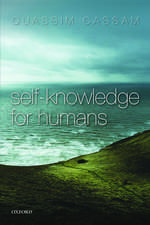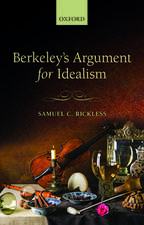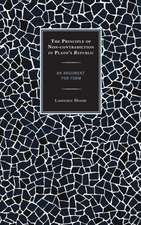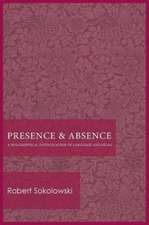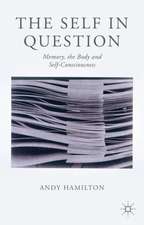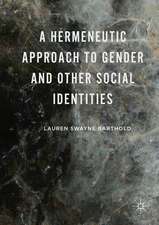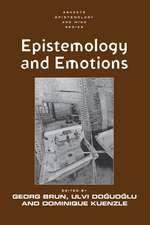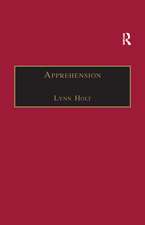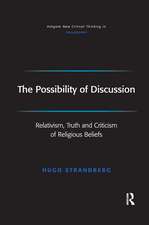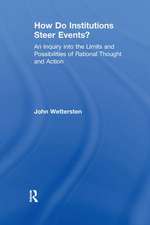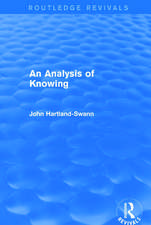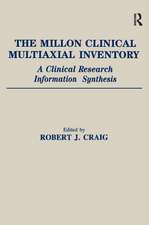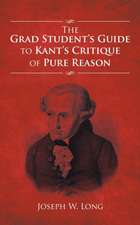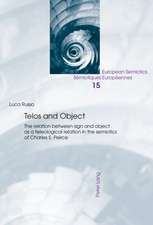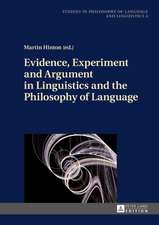Routledge Philosophy GuideBook to Wittgenstein and On Certainty: Routledge Philosophy GuideBooks
Autor Andy Hamiltonen Limba Engleză Hardback – 25 noi 2014
- Wittgenstein's career and the background to his later philosophy
- the central ideas and text of On Certainty, including its responses to G.E. Moore and discussion of fundamental issues in the theory of knowledge
- Wittgenstein's continuing importance in contemporary philosophy.
| Toate formatele și edițiile | Preț | Express |
|---|---|---|
| Paperback (1) | 239.84 lei 3-5 săpt. | +20.90 lei 7-13 zile |
| Taylor & Francis – 23 oct 2014 | 239.84 lei 3-5 săpt. | +20.90 lei 7-13 zile |
| Hardback (1) | 680.73 lei 6-8 săpt. | |
| Taylor & Francis – 25 noi 2014 | 680.73 lei 6-8 săpt. |
Din seria Routledge Philosophy GuideBooks
-
 Preț: 281.33 lei
Preț: 281.33 lei -
 Preț: 272.17 lei
Preț: 272.17 lei -
 Preț: 197.35 lei
Preț: 197.35 lei -
 Preț: 227.00 lei
Preț: 227.00 lei -
 Preț: 226.94 lei
Preț: 226.94 lei -
 Preț: 214.80 lei
Preț: 214.80 lei -
 Preț: 186.35 lei
Preț: 186.35 lei -
 Preț: 212.33 lei
Preț: 212.33 lei -
 Preț: 216.39 lei
Preț: 216.39 lei -
 Preț: 213.98 lei
Preț: 213.98 lei -
 Preț: 224.53 lei
Preț: 224.53 lei -
 Preț: 220.52 lei
Preț: 220.52 lei -
 Preț: 282.51 lei
Preț: 282.51 lei -
 Preț: 239.84 lei
Preț: 239.84 lei -
 Preț: 184.08 lei
Preț: 184.08 lei -
 Preț: 280.26 lei
Preț: 280.26 lei -
 Preț: 215.67 lei
Preț: 215.67 lei -
 Preț: 218.98 lei
Preț: 218.98 lei -
 Preț: 211.62 lei
Preț: 211.62 lei -
 Preț: 212.53 lei
Preț: 212.53 lei -
 Preț: 222.00 lei
Preț: 222.00 lei -
 Preț: 213.42 lei
Preț: 213.42 lei -
 Preț: 186.95 lei
Preț: 186.95 lei -
 Preț: 311.69 lei
Preț: 311.69 lei -
 Preț: 235.36 lei
Preț: 235.36 lei -
 Preț: 239.18 lei
Preț: 239.18 lei -
 Preț: 285.73 lei
Preț: 285.73 lei -
 Preț: 272.36 lei
Preț: 272.36 lei - 26%
 Preț: 161.25 lei
Preț: 161.25 lei -
 Preț: 245.68 lei
Preț: 245.68 lei
Preț: 680.73 lei
Preț vechi: 914.38 lei
-26% Nou
Puncte Express: 1021
Preț estimativ în valută:
130.26€ • 141.93$ • 109.76£
130.26€ • 141.93$ • 109.76£
Carte tipărită la comandă
Livrare economică 23 aprilie-07 mai
Preluare comenzi: 021 569.72.76
Specificații
ISBN-13: 9780415450751
ISBN-10: 0415450756
Pagini: 360
Dimensiuni: 129 x 198 x 23 mm
Greutate: 0.45 kg
Ediția:1
Editura: Taylor & Francis
Colecția Routledge
Seria Routledge Philosophy GuideBooks
Locul publicării:Oxford, United Kingdom
ISBN-10: 0415450756
Pagini: 360
Dimensiuni: 129 x 198 x 23 mm
Greutate: 0.45 kg
Ediția:1
Editura: Taylor & Francis
Colecția Routledge
Seria Routledge Philosophy GuideBooks
Locul publicării:Oxford, United Kingdom
Public țintă
Postgraduate and UndergraduateCuprins
1. Wittgenstein's philosophical development 2. Enduring Wittgensteinian motifs in On Certainty 3. Reading On Certainty: text and work 4. Synopsis of On Certainty 5. Moorean common sense 6. Wittgenstein's account of Moorean propositions 7. Wittgenstein's idea of a "world-picture" 8. On Certainty in the context of 20th century epistemology 9. Moore's "proof of an external world" 10. Responses to scepticism: arguments against moore 11. Responses to scepticism: arguments against the sceptic 12. Interpreting On Certainty 13. Wittgensteinian Kantianism versus Wittgensteinan naturalism 14. Influence and implications. Index
Recenzii
'This unique and highly readable introduction sets Wittgenstein’s late text in its historical context and emphasises enduring themes running through his later philosophy. Using recent work on On Certainty, Hamilton provides his reader with a clear exposition of the work’s major themes, facilitating further engagement.' – Bernhard Weiss, University of Cape Town, South Africa
'Wittgenstein wrote, "Philosophy is not a body of doctrine but an activity… [of] clarification". He shows us paths from metaphysical abstraction to the more habitable, yet largely unrecognised, world of our everyday lives. But how does this therapeutic conception infuse the enigmatic epistemological writings known as On Certainty? As a guide, Hamilton is precisely the sort of reader Wittgenstein would have wanted, one fully engaged in thinking with, and against, the text. Hamilton’s Wittgenstein is a humanist who rejects the current orthodoxy that models philosophy on the natural sciences. By demonstrating the power of the text to stimulate his own thoughts, Hamilton encourages us to think with the text ourselves.' - David Macarthur, Sydney University, Australia
'Wittgenstein wrote, "Philosophy is not a body of doctrine but an activity… [of] clarification". He shows us paths from metaphysical abstraction to the more habitable, yet largely unrecognised, world of our everyday lives. But how does this therapeutic conception infuse the enigmatic epistemological writings known as On Certainty? As a guide, Hamilton is precisely the sort of reader Wittgenstein would have wanted, one fully engaged in thinking with, and against, the text. Hamilton’s Wittgenstein is a humanist who rejects the current orthodoxy that models philosophy on the natural sciences. By demonstrating the power of the text to stimulate his own thoughts, Hamilton encourages us to think with the text ourselves.' - David Macarthur, Sydney University, Australia
Descriere
This Guidebook introduces and assesses Wittgenstein's On Certainty, explaining its central theme concerning the refutation of sceptisim and the nature of the theory of knowledge.


